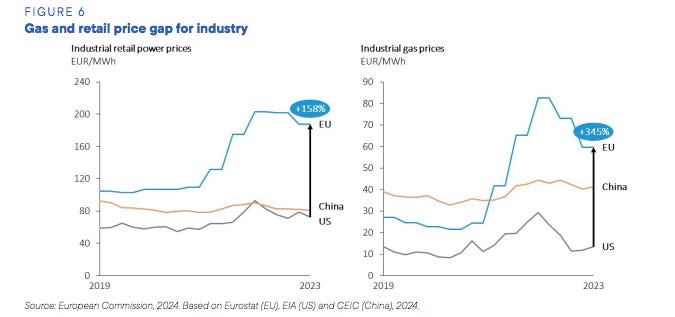Draghi's Nasty Subterfuge on EU's Future
What was Mario Draghi's biggest Mistake in his Report on the EU Economy?
“We need growth!” But we are in terminal decline!
“We need to encourage innovation!” But our best ideas go to America!
“We need a strong Single Market!” But our population is dying off fast! What is the cause? What are the solutions?
“We need cheap energy above all!” But green ideology doesn’t cut it!
“We must cut coal and gas for wind!” Who are biggest geopolitical fools in the world?
“We must build arms and armies!” But the Community goal is peace for all!
“We need to give people jobs!” But they no longer have decent homes!
“We need €800 Billions annually more!” But we are up to our chins in debt already!
“We need stable money!” But inflation is built into the €uro system!
“We need to proclaim our values!” But our money is becoming valueless!
“We have twice as many problems as they did when Europe was in ruins after World War 2.” Help the poor bureaucrats with twice the money!
Really?
“We need MONEY! MONEY! MONEY! We don’t need democracy. We have managers.”
Where did it all go wrong?
One word: TRUST.
The Draghi Report Attack
Peace and prosperity came from the Community Method and its democratic principles of human rights. Don’t tell that to the Draghi team of bankers and Commission officials (allegedly guardians of the treaties) who put the report together. They don’t want to hear it.
The Draghi Report says the Community governance is all old hat. They want to turn historic achievements such as this peace and prosperity upside down. “Bankers know best.” Prepare for more penury!
Here’s what they say after demanding oodles of money from taxpayers:
The final building block is the will to reform the EU’s governance, increasing the depth of coordination and reducing the regulatory burden.
The “Community Method” has been a source of the EU’s success, but it was established in a different era, when the Union was smaller and faced a different set of challenges. For much of the EU’s history, the most important focus has been generating internal integration and cohesion, which Member States could afford to address at their own pace. However, the EU is now much larger, creating more veto players, and the challenges it faces are now often imposed on it from outside. To move forward, Europe must act as a Union in a way it never has before, based around a renewed European partnership among Member States.
How do you inspire trust in national partnerships? Buy them cocktails? You need honest, open governance. If you do not know how to guarantee honesty in European public affairs and accountability you cannot have democracy. Honesty is not dependent on Europe’s size.
What the Politicians blocked in the Community Method
The Community Method is designed as the most accountable system of governance. It is a system of expanding democracy and arbitrating conflicts. It opened up freedoms to Europeans and guaranteed further freedoms. That is why it worked.
As described in the treaties it provides for democracy at five levels. All levels have to come to a consensus. All decisions have to be fair and just. It provides the still incomplete standard of governance. All depends on the leadership.
How do you bring nations together that have fought numerous deadly wars against each other? You create a Council of national government ministers who meet in public. (Never happened yet.)
How do you bring interests of workers, industries and consumers together? You create a tripartite Consultative Council for in-depth innovation and social help that is elected by European associations and has law-making powers as a body of representative civil society. (Never happened yet!)
How do you give individuals a voice so that the ‘big boys’ of big government or big business, do not smash the rights of the poor and oppressed? You elect a Parliament with one person, one vote across the whole of the Community area. (Never happened yet).
How do you guarantee a fair arbitration of interests between all the above? In the European Commission you select only people of the most impartial, non-partisan character and experience who can prove they have the full trust of the people. They then swear in the European Court to be honest according to a solemn oath and rules. (Why are only partisan politicians selected? By their oaths of office they should renounce party membership.)
How do you guarantee the rule of law is applied to governments. civil society, individuals and also the European civil service? You make the judges in the European Court of Justice responsible before democratic institutions. (Never happened yet.)
All the above democratic conditions are required by the European Community treaties. Some articles were blocked by politicians who did not like a democratic Europe to replace their comfy despotic domains.
Is this an exaggeration? Judge for yourself. No elections according to the letter and spirit of the original treaties have taken place. YET. Seventy years later. Who is responsible?
If the Draghi team were so confident that the Community Method was not useful,
why did they not describe and analyse, blow by blow, how any of the above elections or democratic conditions will cause problems about the honest management of taxpayers’ money?
Why shouldn’t the Council of Ministers be open to the public if the treaties say it should be?
Why do Europeans not have parliamentary elections across the entire EU based on one person, one vote and one Statute as the treaties say?
Why is the selection of the Commission president the plaything of the secretive Council of Ministers? Shouldn’t choice of the person be subject to public opinion? Why haven’t the politicians reduced the number of Commissioners as required by the treaties?
The Target is Schumanistics
If you want to drum up an extra €800 Billion per year that you can spend as you wish, the last name you would want to raise is Robert Schuman. Thanks to him and his colleagues, the Community Method ended wars in Western Europe. Wars and disputes had been burning investments, blasting houses apart and killing citizens for centuries.
It brought an end to postwar corruption and raised the European economy from ruins to be stronger and surpass mighty America. It made war ‘not only unthinkable but materially impossible’ — an objective that has global applications: world peace.
Europe was set on ‘Thirty Glorious Years’, postwar miracle years of prosperity .. until bureaucrats changed the system. The added their own bureaucratic technocracies of Maastricht and later self-serving indulgences. Nonetheless the peace of the Community has remained solid and intact.
Why is this person, Robert Schuman, reviled or his memory obliterated? Ask those who blocked the progress of the supranational Community Method! He selflessly provided the constitutional means to revive European democracy. His innovation, he declared in 1950, could bring peace and prosperity from Iberia to Siberia and free all countries under Soviet control. Is that a small challenge? It would have brought Russia democracy (as the Community did for post-Nazi Germany) and Western Europe cheap energy, gas and coal. Such a major geopolitical change would have changed the planet for the better.
It brought an innovative constitutional change to ancient States, and empowered them. They re-established human rights and fundamental freedom while providing legal powers to stop international cartels exploiting the weak. Schuman initiated a completely new form of democratic governance called the supranational Community, flexible, free and fair for reforming the modern world of ancient ills, ideologies and corruption.
The Draghi report team obviously does not wish to discuss how the modern democracy works. They are content with the wrong-headed technocracy they created and want to continue. Nothing to see! We just want an extra 800 billion euros a year.
The report fails to make any appraisal about how the Community Method should work, who tried to block and sabotage it and for what reasons, and how it can be brought to act with democratic force on the problems mentioned above.
The technocrats have little taste for anyone wanting to establish the original democratic institutions and install the elections that the treaties still require. Why are fair elections and open government refused?
Where does democratic control come into their thinking?
Take this prime example of double speak. Here is the first part of the sentence.
Governance of the Action Plans should aim to minimise bureaucracy …
Here’s the second part of the sentence. Note how it continues:
and involve a wide range of stakeholders: Member States, technical experts, the private sector, and EU institutions and agencies.
If this is how the Draghi report suggests bureaucracy is reduced, then the technocratic machine is out of control.
How much longer will the suffering people of Europe have to pay the price for this folly?
Technocrats estimation of themselves
How does the Draghi report weigh up the technocratic alternative to Community governance? Here’s an extract.
Under the current EU Budget, around EUR 64 billion is spent on investment in skills but results have been limited. This failure is down to several factors.
First, the lack of willingness among Member States, who are responsible for skills policies, to go beyond soft forms of coordination.
Second, insufficient involvement of industry in developing job-specific skills.
Third, EU skills investments suffer from a lack of systematic evaluations, preventing learning about the effectiveness of alternative strategies and refining of interventions.
Fourth, collective efforts to improve skills are hampered by an underuse of “skills intelligence”, meaning reliable, granular and comparable information on skills needs, existing stocks and desired flows within and across Member States.
Such information is essential to assess existing and forecast skills gaps across sectors and regions, and target policies and spending appropriately. While new sources of information and methodologies have become available, the actual use of granular skills data for policy design, remains low and uneven across both EU institutions and individual Member States.
Who is accountable? Who can be thrown out of office by the public for wasting money and plain incompetence? Where is the political and democratic dimensions?
Accountability
What did the economists completely overlook in the economy?
Trust. The first requirement of a sound economy is an environment of trust, law and justice. Technocracies often lead to corruption.
Decline. How did technocrats ignore the most important issue: population decline? No children, no future economy. Is the cause policy, biological, chemical, social or deliberate poison in the environment? Without young people Europe is on a slide to its own death.
Housing. Can the economists tell us why inflation was built into the system so that housing (which does not increase in real material value) becomes unaffordable? Jobs are exported to China and other countries, thus impoverishing the whole families. Will they be coming back? How and when?
Why did bureaucrats come up with such silly policies without asking he people?
Energy policy. Europe’s energy poverty is exploited by competitors and enemies, OPEC, Russia and USA.
Community Europe built a massive trade surplus, until in 1973 Arab OPEC quadrupled oil prices. Then the Dutch quadrupled gas prices too. OPEC used the embargo and price hike to blackmail Europe’s policy against Israel. But the Dutch and the Norwegians, were they just opportunists? Why weren’t Europe’s anti-cartel powers used to bust this energy conspiracy. Why did the bureaucrats not learn their lesson when it came to over-dependency on Russian gas? Why did they refuse to create an Energy Community that would have solved the problem?
Europe’s greatest Threat
Here’s what Robert Schuman warned about technocrats:
The European integration that we are involved in realising cannot be considered without a minimum of political integration in the long term. It is a logical complement and necessary.
Europe must have a democratic foundation; the Councils, the Committees, and the other organs, must be placed under a system of public opinion, a system that should be efficient without blocking action or useful initiatives.
European integration must in a general fashion, avoid the errors of national democracies, above all the excess of bureaucracy and technocracy. Complicating the machinery of government and increasing the number of employees is no way to guarantee against the misuse of power, but will end up increasing internal competition and favoritism.
The prime danger that threatens our supranational services is inflexible administration.
Quite the opposite is needed. Our populations by their representatives specially elected to the institutions should follow and help their development. It will be necessary in the near future to foresee the election of the members of the European Assembly by direct universal suffrage so that they can exercise powers of debate and control in conformity with the Charter of the Community.
Why does Draghi attack the Community Method?
Supranational Democracy says Good Bye to despotic technocrats.















The article raises crucial points about the tension between technocratic governance and democratic accountability in the EU. While Draghi's report emphasizes economic metrics and bureaucratic solutions, it overlooks what Schuman correctly identified as the fundamental pillar of European integration: democratic legitimacy through genuine public participation.
Three aspects particularly stand out:
1. The Community Method's unrealized potential - As highlighted, key democratic provisions like public Council meetings and direct European-wide parliamentary elections remain unimplemented after 70 years. This represents not just a procedural failing but a deeper democratic deficit.
2. The trust deficit - The article rightly emphasizes how technocratic management without democratic oversight has eroded public trust. The €800 billion funding request exemplifies this disconnect - seeking massive resources without addressing fundamental governance issues.
3. Strategic vulnerabilities - The analysis of energy policy failures (OPEC crisis, Russian gas dependence) demonstrates how bureaucratic decision-making without democratic accountability leads to poor strategic choices that harm European interests.
Rather than dismissing the Community Method as outdated, perhaps we should consider that its core democratic principles remain unfinished business - not because they're impractical, but because they would require genuine power-sharing with European citizens. This seems particularly relevant given current challenges around trust, legitimacy and strategic autonomy.
What are others' thoughts on how to better balance necessary technical expertise with democratic accountability in EU governance?